Richard Pryor: Omit the Logic Blu-ray Movie
HomeRichard Pryor: Omit the Logic Blu-ray Movie 
Magnolia Pictures | 2013 | 83 min | Rated R | Feb 03, 2015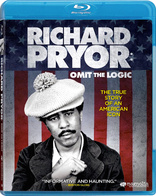
Movie rating
6.5 | / 10 |
Blu-ray rating
| Users | 0.0 | |
| Reviewer | 3.5 | |
| Overall | 3.5 |
Overview
Richard Pryor: Omit the Logic (2013)
The life and times of Richard Pryor.
Starring: Richard Pryor, Jennifer Lee Pryor, Mel Brooks, Robin Williams, Lily TomlinDirector: Marina Zenovich
| Documentary | Uncertain |
| Biography | Uncertain |
Specifications
Video
Video codec: MPEG-4 AVC
Video resolution: 1080p
Aspect ratio: 1.78:1
Original aspect ratio: 1.78:1
Audio
English: DTS-HD Master Audio 2.0 (48kHz, 24-bit)
Subtitles
English SDH, Spanish
Discs
25GB Blu-ray Disc
Single disc (1 BD)
BD-Live
Playback
Region A (C untested)
Review
Rating summary
| Movie | 3.5 | |
| Video | 3.5 | |
| Audio | 3.5 | |
| Extras | 2.0 | |
| Overall | 3.5 |
Richard Pryor: Omit the Logic Blu-ray Movie Review
What's Logic Got to Do with It?
Reviewed by Michael Reuben February 2, 2015As a comic, actor and show business phenomenon, Richard Pryor's influence has been so pervasive that it may be hard to appreciate, for anyone who wasn't there at the time, what a jolt Pryor gave to American culture when he first arrived on the scene. No comic, black or white, had ever talked about race to a mainstream audience as frankly as Pryor did. Today any comic can do so because Pryor broke down the barriers, beginning with his hit 1974 standup album That N*****'s Crazy! (a title no one would dare use now). The first African-American host of Saturday Night Live, co-writer of Mel Brooks's Blazing Saddles (and Brooks's first choice to star in the film, until he was overruled by Warner Brothers), star of his own NBC variety show in 1977—which the network canceled after four episodes when the comic refused to tone down his humor—and ultimately the first recipient of the Kennedy Center's Mark Twain Prize for American Humor, Pryor is widely acknowledged by peers of all races and creeds to be the most influential humorist of his era. One of Pryor's most reliable sources of material was his own chaotic and often self-destructive life, and he was as ruthless in dissecting—and then presenting to an audience—his own faults and failings as he was in commenting on race relations and social issues. Indeed, one of the hallmarks of Pryor's standup was the ease with which he segued from personal experience to social satire and back again, creating readily identifiable characters and acting out each part as he went along. Honesty was the secret to Pryor's universal appeal. You knew instinctively that, at least while he was performing, he always told the truth, no matter how unpleasant—and especially about himself. Marina Zenovich, who won two Emmy awards for her portrait of director Roman Polanski (Roman Polanski: Wanted and Desired ), has assembled a biography of Pryor, using new interviews with fellow comics, former business associates, ex-wives and girlfriends, as well as vintage interview clips and excerpts from Pryor's work. The result is an excellent overview for those who only know Pryor from movies like Silver Streak or Stir Crazy, and it will fill in gaps even for fans who know Pryor's standup work. Richard Pryor: Omit the Logic originally aired on Showtime in 2013 but has now been acquired by Magnolia Pictures.
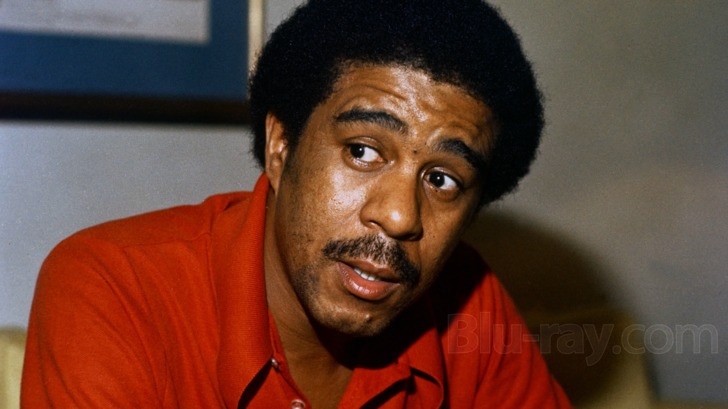
Zenovich begins with Pryor's early attempts at standup, saving his unconventional upbringing—and that's putting it mildly—for a later point in the film after she's introduced his stern-faced grandmother in an interview clip. Having attained enough success as a Bill Cosby knock-off to get Las Vegas bookings, Pryor found himself staring into the audience one night in 1967 and, spotting Dean Martin, imagined how he looked on stage to the famous entertainer. He walked off stage, abandoned his existing career, and spent the next few years immersing himself in what was then known as "the counterculture", much of it in San Francisco. In the early Seventies, he re-emerged with the profane, aggressive and shockingly hilarious style that made him a sensation. Even the battles he lost, like those with Warner over starring in Blazing Saddles and with NBC over his TV show, added to his reputation as a comic who was too edgy for the establishment. Everyone wanted to work with him. He continued to write for Mel Brooks, and also wrote for Lily Tomlin's first TV special (winning an Emmy), as well as for other TV shows. The box office success of Silver Streak, the first of his many successful pairings with Gene Wilder, cemented his status as a movie star, a process that began with his supporting role in the Billie Holiday bio-pic, Lady Sings the Blues (1972). Throughout this period, Pryor continued to release albums and appear in comedy clubs, where the audience was routinely crowded with fellow comics, who ranked among his biggest fans. Zenovich tells this story effectively, blending vintage photos and appearances (including clips with Johnny Carson on The Tonight Show, where Pryor was a regular guest), with contemporary reflections from Mel Brooks, Lily Tomlin, Robin Williams, Bob Newhart, comedy writer and director David Steinberg, Dave Chappelle, Mike Epps, Budd Friedman (founder of the Improv comedy club), actor Stan Shaw (who co-starred with Pryor in Harlem Nights), Whoopi Goldberg, former Universal Studios president Thom Mount, director Paul Schrader (who directed Pryor in Blue Collar), novelist Walter Moseley and an assortment of the comic's lawyers, managers, ex-wives, former girlfriends and biographers. At the same time, Zenovich also covers the parallel story of Pryor's personal life, a constant source of rich comic material because he seemed to bounce from one disaster to another. None of this material will be new to Pryor's fans, because most of it was widely reported at the time. What wasn't reported, Pryor publicized himself in his act. Every meltdown, encounter with law enforcement, health disaster and substance abuse problem became a comedy routine. Zenovich includes a clip from the 1979 film Richard Pryor: Live in Concert in which the comedian re-enacts his early heart attack, transforming it into an extended dialogue between his whimpering self and the infarction, which he endows with the personality of a relentless debt collector. But the most famous example is Pryor's detailed account of his addiction to freebase cocaine in Richard Pryor: Live on the Sunset Strip (1982), where he describes how his friends tried to rescue him, while his friendly crack pipe whispered in his ear not to listen—and Pryor plays both the friends and the pipe with complete conviction. Pryor's freebase addiction led to his near-death from a fire that was thought at the time to have been an accident but is now known to have been a botched suicide attempt. Using clips from the comic's autobiographical film, Jo Jo Dancer, Your Life Is Calling (1986), Zenovich recreates the incident. Interviews with Pryor's friends and doctors remind the viewer just how unlikely the comedian's survival seemed at the time. (At one point, Pryor actually saw a TV broadcast reporting that he'd died.) Though he survived and continued to make films, most of them were forgettable vehicles like Superman III (1983). Pryor's career might well have had a second, third and even fourth act, if the comic hadn't developed multiple sclerosis, which was diagnosed in 1986. As Whoopi Goldberg stresses, so much of Pryor's gift depended on his kinetic energy, the animated expression, the constant motion, the ability to adjust instantly to what was happening in the moment. As the disease robbed him of those abilities, he largely retired from public life. When Pryor died in December 2005, he had been in a wheel-chair for almost fifteen years. He can be seen using a motorized scooter in his last film appearance in David Lynch's Lost Highway. Zenovich's film concludes with moving tributes.
Richard Pryor: Omit the Logic Blu-ray Movie, Video Quality 
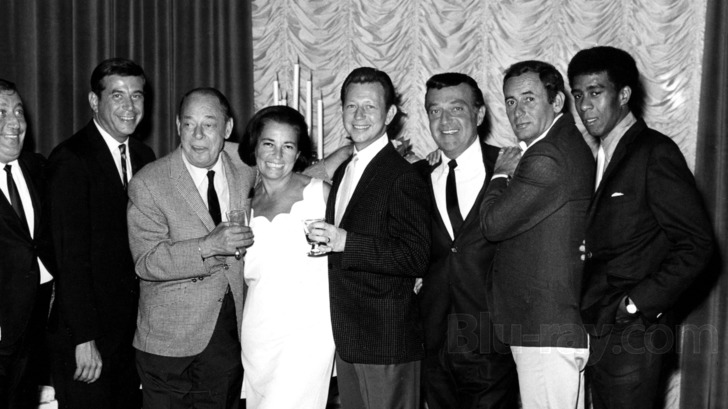
Richard Pryor: Omit the Logic was shot digitally by documentary cinematographer Christine Burrill (Shut Up and Sing) and finished on a digital intermediate, where the diverse sources, including photographs, kinescopes and old film clips, were blended together. Magnolia's 1080p, AVC-encoded Blu-ray was presumably derived directly from digital files. The contemporary interviews have the clear, sharp image that one would expect from recent digital photography, and the older clips look as good as the sources permit, although most of the scenes from Pryor's films appear to have been derived from standard-definition video transfers. One of the biggest beneficiaries of the HD treatment are the photographs, many of which are rare and show Pryor in situations not often seen, e.g. his early Vegas years. Given the limited extras, Magnolia has opted to place this 83-minute film on a BD-25, but the digital origination and the nature of "talking head" footage allows for efficient compression. The average bitrate of 21.999 Mbps is sufficient to avoid any noticeable artifacts.
Richard Pryor: Omit the Logic Blu-ray Movie, Audio Quality 
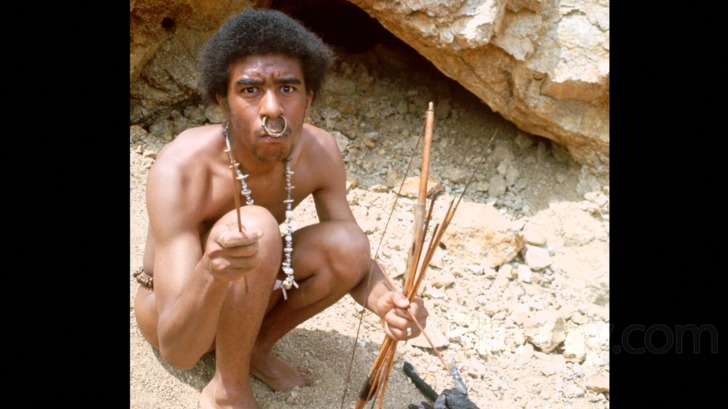
Omit the Logic has a stereo soundtrack, encoded in lossless DTS-HD MA, which delivers the interviews clearly, as well as the tracks from the older clips (which sound like they have been cleaned up for this mix). Pryor's concert films were released in either mono or stereo, so that those clips have not suffered any diminution in quality. The film's score was provided by jazz musician Mocean Worker a/k/a Adam Dorn, who has contributed tracks to such films as The Devil Wears Prada and Mr. and Mrs. Smith.
Richard Pryor: Omit the Logic Blu-ray Movie, Special Features and Extras 
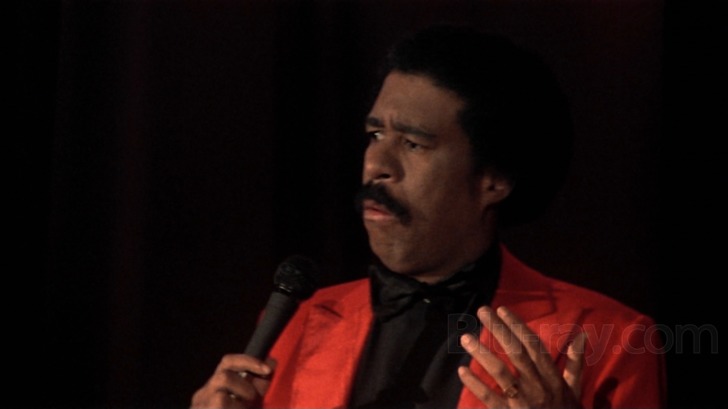
- Additional Interviews (1080p; 1.78:1; 34:38): A "play all" function is included. Some wonderful anecdotes are included, especially from Brooks, Goldberg, Tomlin and Jennifer Lee Pryor.
- Mel Brooks
- Whoopi Goldberg
- Lily Tomlin
- Jennifer Lee Pryor
- Willie Nelson
- Quincy Jones
- David Banks
- David Steinberg
- Also from Magnolia Home Entertainment: The disc includes trailers for Life Itself and The Two Faces of January, as well as promos for the Chideo web service and AXS TV. These also play at startup, where they can be skipped with the chapter forward button.
- BD-Live: As of this writing, attempting to access BD-Live gave the message "Check back later for updates".
Richard Pryor: Omit the Logic Blu-ray Movie, Overall Score and Recommendation 
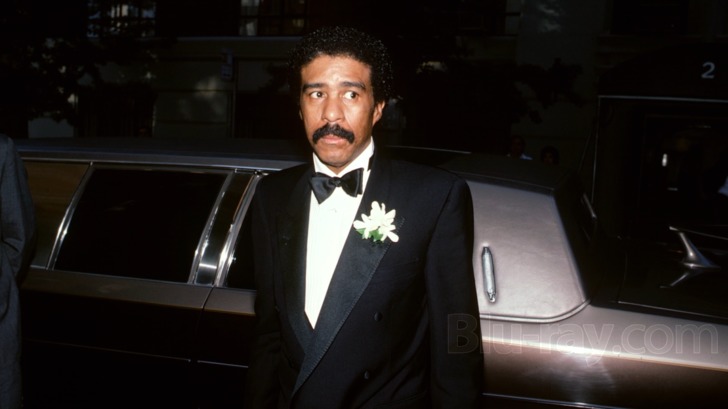
Two of Richard Pryor's concert films are sitting in Sony's vault, and the third, Live in Concert, resides with HBO. The most fitting tribute to this unique performer would be to release these works on Blu-ray with new transfers, because they represent Pryor at the height of his powers doing what he did best and loved most. Zenovich's documentary provides an intriguing look at the man, but only a glimpse of the work. Recommended, but don't stop here.
Similar titles
Similar titles you might also like

Bowling for Columbine
2002

The Salt of the Earth
Le Sel de la Terre
2014

Waiting for "Superman"
2010

When the Levees Broke: A Requiem In Four Acts
2006

RBG
2018

Elstree 1976
2015

Best of Enemies
2015

Babies
Bébé(s)
2010

Tupac: Resurrection
2003

I Am Evel Knievel
2014

The Kid Stays in the Picture
2002

The Defiant Ones
2017

Fahrenheit 9/11
2004

Studio 54: The Documentary
2018

The Dust Bowl
Ken Burns
2012

I Am Not Your Negro
2016

Inside Job
2010

Won't You Be My Neighbor?
2018

That Guy Dick Miller
Slipcover in Original Pressing / Bonus Film: Starhops
2014

Spitfire: The Plane That Saved the World
2018